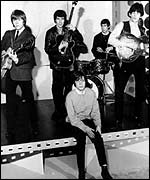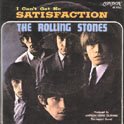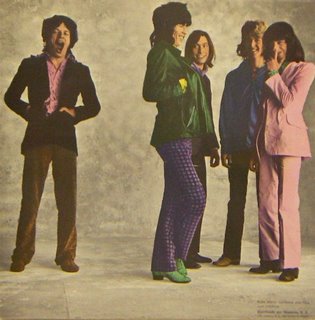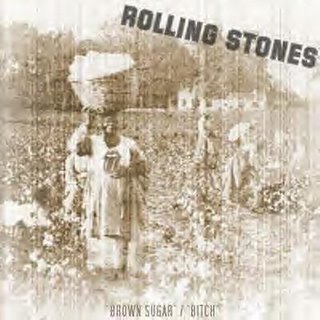DIRTY WORK
So many words have been written about the Rolling Stones that there is little more one can say. Still, I have listened to little else but the Stones for the last week or so, so here are a few more words to eat tomorrow’s fish and chips from.
First, if you don’t own every Stones album from the 60s, plus 1971’s Sticky Fingers and 1972’s Exile on Main Street, you are implying a curious aesthetic judgment whereby you have prioritised other music above these dozen or so records. This is really akin to saying you don’t like rock and roll. Maybe this is something one only realises after the event.
With the exception of Their Satanic Majesties Request, a record whose mainstream oddness is matched only by The Beatles, they are all, on the face of it, relatively straightforward rock ‘n’ roll records – musically far less tricksy than the Beatles, lyrically analogous to the Kinks, poppier and whiter and Britisher than the r’n’b cuts they sung their praises to. And yet, this is difficult, complicated, dense music: far more challenging than any of their pop contemporaries, including Dylan. After 12 years and countless plays, I still don’t think I get Exile on Main Street. What could be so Byzantine about three chords?

We all know by now that the Beatles were working class boys – they aspired to be working class boys made good, especially Lennon, whose art school dropout status was tempered by his Aunt Mimi’s work ethic. The Beatles got into playing guitars partly because it was a way of getting somewhere in the world : they were careerists through and through. Their music, at least until The White Album, was designed not to offend. Sure, it was sometimes raunchy (their version of Chuck Berry’s “Rock and Roll Music” is positively incendiary), but for the Beatles sex and drugs and music are all implicitly adolescent : innocent, playful, fun. Just how capital likes it (I should point out, by the way, that I am a Beatles fan).
For the Stones, whose vocalist had a prominent member of the Conservative Party for a mother, music was not so much a way to achieve money or fame (though the Stones were certainly not shy of either), but of escaping the compromises and defeats and drudgeries of Middle England. Jagger was brought up in Dartford – this is Ballardian territory in the extreme : its outward calm belies a pent-up aggression, a desire for danger. The Stones articulated the deeply repressed death-wish of the middle classes.

1965 was Mick Jagger’s year of dissatisfaction. He said so in so many words in their first world-conquering song, but no less in “The Last Time,” where he accuses his girl: “You don’t try very hard to please me / With what you know it should be easy”. In that song, he nevertheless wants to hang on to the girl, but in “It’s All Over Now” he’s glad to see the back of her: “Table’s turning now / Her turn to cry.” And in “Get off of my Cloud,” he wouldn’t mind seeing the back of everyone else too.
By 1966, existential rot had set in. “Something happened to me yesterday” might be a drug-song, but the lyrics – “He don’t know just where it’s gone / He don’t really care at all / No one’s sure just what it was / Or the meaning and the cause” – are pure nihilism. 1967 was something of a wash-out – all that peace and love stuff was hardly the Stones’s bag, except on “We Love You,” one of their most loveless, and best, singles – but by 1968 he was back with us again : and further away than ever, as he twists and curls his lips in defiance. On hearing Jagger step into Lucifer’s shoes on “Sympathy for the Devil,” one rather feels for the devil for having his reputation besmirched by the comparison.
It is ingenuous to say that the soul of the Stones lies in Keith Richards’s heart. In fact, it misses the point: the Stones don’t really have a soul. They are cold and calculating and mocking and cruel, and this is down to Mick Jagger, one of the great ironists of rock music:
Jagger is obsessed with distance. He forces the Stones' music to gaze across (and down) the generation gap and the money gap and the feeling gap and the meaning gap. But then, powered by the other Stones – all of them, like most of the Stones' fans, somewhat more simple-minded than Jagger – the music leaps, so that as a totality it challenges that frustrating, ubiquitous, perhaps metaphysical margin between reach and grasp that presents itself so sharply to human beings with the leisure to think about it. This dual commitment to irony and ecstasy makes the Stones exemplary modernists.
- Robert Christgau

1969 was the year of Altamont, where a young black fan was killed by Hell’s Angels whom the Stones had employed as bouncers, as the Stones themselves played “Sympathy for the Devil” in the background. (Though it should be pointed out that, as myth always follows legend, the Stones were actually playing “Under my Thumb,” and it is usually suggested now that the Angels were actually hired by the Grateful Dead, who were the support act.)
1971 saw the release of Sticky Fingers, their sleaziest, most bombed-out record up to that point. It contains “Brown Sugar,” perhaps their greatest single from an embarrassment of riches. It begins with a classic Richards riff, choppy and staccatoid, before Wyman and Watts enter with a rhythm that almost plods. It is a warm and ingratiating sound, despite the death rattle percussion which undercuts it. A hint of disturbance arrives a few bars later in a middle-eighty chord sequence (a little like “Gimme Shelter”), but then we return to the main riff, friendly again. Mick comes in a little later. Such is the feel of the song, that I didn’t pay attention to the lyrics for years.

Gold coast slave ship bound for cotton fields,
Sold in a market down in New Orleans.
Scarred old slaver know he’s doin’ alright.
Hear him whip the women just around midnight.
Ah brown sugar how come you taste so good
Brown sugar, just like a young girl should
Drums beating, cold English blood runs hot,
Lady of the house wondering where it’s gonna stop.
House boy knows that he’s doin’ alright.
You should a heard him just around midnight.
Ah brown sugar how come you taste so good
Brown sugar, just like a black girl should
I bet your mama was a tent show queen,
And all her boyfriends were sweet sixteen.
I’m no schoolboy but I know what I like,
You should have heard me just around midnight.
Ah brown sugar how come you taste so good
Brown sugar, just like a young girl should.
Maybe I’m a missing a few, but I count slavery, sado-masochism, prostitution, cunnilingus, colonial exploitation, rape, possibly gang-rape, and paedophilia in there – all set against a background of racism. Can he be serious? Is it a complete joke? It is clearly exploitative, both racially and sexually – the lubricious music implies that – but does that mean it’s bad?
After Sticky Fingers came Exile on Main Street : if you want an analysis of that, you will have to go elsewhere : I don’t pretend to understand it. It is a bit like Ulysses or Proust: it is something to which one aspires. I listen to it less regularly than, say, Aftermath or Let it Bleed, but it fizzes with mystery and filth whenever I do give it a spin.
Unlike their major contemporaries (the Beatles, Dylan, Hendrix, Redding), who make more sense if explored chronologically, there is no suggested entry-point to getting into the Stones. I would not suggest starting with Exile on Main Street (which is rather like getting into Joyce via Finnegans Wake) or Their Satanic Majesties Request (which I recommend only for the sake of completeness – the Stones made very unconvincing hippies). Let it Bleed is probably my favourite, followed by The Rolling Stones, Aftermath and Sticky Fingers. But this is mere personal choice. As Christgau concludes, “When the guitars and the drums and the voice come together in those elementary patters that no one else has ever quite managed to simulate, the most undeniable excitement is a virtually automatic result. To insist that this excitement doesn't reach you is not to articulate an aesthetic judgment but to assert a rather uninteresting crotchet of taste. It is to boast that you don't like rock and roll itself.”

2 Comments:
Hm. Maybe I should revisit them, but Mick really does get on my nerves. That said, I'd never really looked at the lyrics to Brown Sugar before, and they're really quite intriguing.
I suppose the thing that I find with the Stones is that listening to the white boy RnB makes me want to listen to the real thing.
Alexandra - I kinda agree with you on TSMR. I shouldn't have said that one should have it "for the sake of completeness," but "for the sake of being an interesting cul-de-sac, a failed yet admirable experiment." There's quite a bit of it which wouldn't sound out of place on A Piper at the Gates of Dawn. "She's a Rainbow" is indeed a great single, and "Citadel" and "Lantern" and even the Bill Wyman one stand as dusty treasures.
MF - Mick is now, of course, annoying, especially to men of our age who ask "pur-leeze, how the hell does a 60 year old man get to go out with a 20 year old model?!" Mick and Keith become self-parodies as soon as the Stones became an industry. Mick now does detachment-by-rote : you suspect that actually he really wants to be loved; he certainly never wanted that in the 60s. But go onto Youtube and check out a half-dozen or so videos or live performances from the 60s. I don't care what gender or sexuality you are : it don't get no sexier than that...
Post a Comment
<< Home